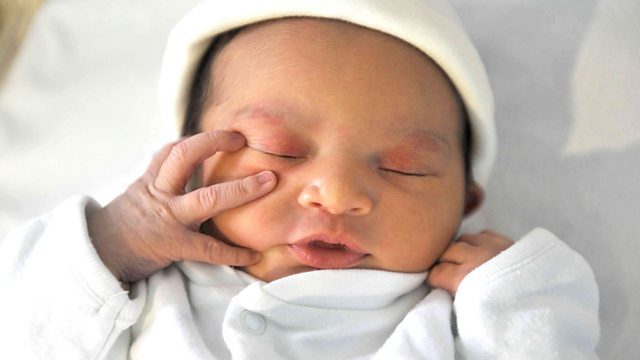Domestic violence, the falling birth rate and women in folk music
Should domestic violence be a specific crime? Has the birth rate fallen because families cannot afford to have as many children as they would like to? And women in folk music.
Should domestic violence be a specific crime? Both Labour and the Conservatives have said they'll look again at the law. Women's Aid says coercion and controlling behaviour should become a specific offence - but we hear from a lawyer who says it won't work.
The birth rate has fallen, after big climbs over the last decade. The Office for National Statistics says economic uncertainty could be to blame. So are families deciding they can't afford to have as many children as they'd like to?
Holocaust survivor Elizabeth Lucas Harrison talks about evading the Nazis in occupied Europe, on the 70th anniversary of the last convoy leaving occupied Paris for the concentration camps.
And women in folk music. As the 50th Cambridge Folk Festival gets underway, we look at the work of female folk musicians - and ask whether they're getting a raw deal in bookings for major events.
Last on
More episodes
Previous
Chapters
-
Domestic violence law
Duration: 08:57
Birth rate
Duration: 10:07
Elizabeth Harrison
Duration: 08:42
Women in folk music
Duration: 10:33
Domestic violence law
Pressure has mounted this week for the Conservative MP David Ruffley to resign immediately from his post, after he announced he would step down next May – months after accepting a police caution for assaulting his ex-girlfriend. It comes in the same week that both the Prime Minister and shadow home secretary Yvette Cooper have said their respective parties will look at specific offences relating to domestic violence. Women’s Aid, the leading UK charity working to combat domestic violence, advocates new legislation which would criminalise the coercive and controlling behaviour present in domestic violence cases. The charity believes this new law would help police and the courts take the pattern of abuse into account, rather than simply the physical acts of violence. But there is scepticism about how effective such a law would be in practice. Jenni is joined by Hilary Fisher, Director of Policy Voice and Membership at Women’s Aid, and Clare Ashcroft, Criminal Defence Barrister at Garden Court North Chambers in Manchester.Birth rate
The birth rate has fallen sharply, after more than a decade of big increases. There were more than 30,000 fewer births in England and Wales in 2013 than the year before – that’s a drop of 4.3%, the biggest for nearly 40 years. The report, produced by the Office for National Statistics, says it could be because of economic uncertainty, and changes in benefits for families with children, which could lead families to decide they can’t afford to have any more children. Melita Dennett went to meet one family who’d been discussing having a third child, but have decided they can only afford the two they already have.  Rachel Rawles is a part-time hairdresser; her husband Jack works in computing. Their son Louis is 3, and their daughter Amelia 15 months old. Jenni is joined by Peter Matthews, from the Office for National Statistics, who wrote the report.Â
Elizabeth Harrison
This week marks 70 years since the last convoy of prisoners left Paris on its way to the Nazi concentration camps of World War II. One of those on board was Jewish-born Jacqui Aubry who had lived out the war in Paris but was arrested just weeks before the city was liberated on 25th August 1944. She was gassed at Auschwitz when it was discovered that she was pregnant. Her niece, Elizabeth Lucas Harrison, had survived the war by hiding in Belgium and southern France. Elizabeth, now aged 91, joins Jenni to discuss her life – including how she ended up being sent to meet senior German generals in Belgian Prisoner of War camps in 1947, shortly before the Nuremberg trials.Â
Women in folk music
This weekend sees the start of the 50th Cambridge Folk Festival. Among the performers will be Sinead O’Connor and Eddi Reader. Women have played a big role in the Festival from the start, with Peggy Seeger among those performing back in 1965. Folk music written and performed by women seems at first sight to be in good health, but behind the scenes of the folk world there have been rumblings, with complaints that women still aren’t being given the same opportunities as men. Jenni is joined by Belinda O’Hooley, from the duo O’Hooley and Tidow (pronounced Tee-do), who are performing at Cambridge tomorrow, and by Janet Russell, who has been part of the folk scene since the 1980s, performing both as a solo artist and with the group Sisters Unlimited.
Credits
Role Contributor Presenter Jenni Murray Producer Sarah Lewthwaite Interviewed Guest Elizabeth Harrison Broadcast
- Fri 1 Aug 2014 10:00Â鶹ԼÅÄ Radio 4
Follow us on Instagram
Get all the pictures, videos, behind the scenes and more from Woman’s Hour
Podcast
-
![]()
Woman's Hour
Women's voices and women's lives - topical conversations to inform, challenge and inspire.


